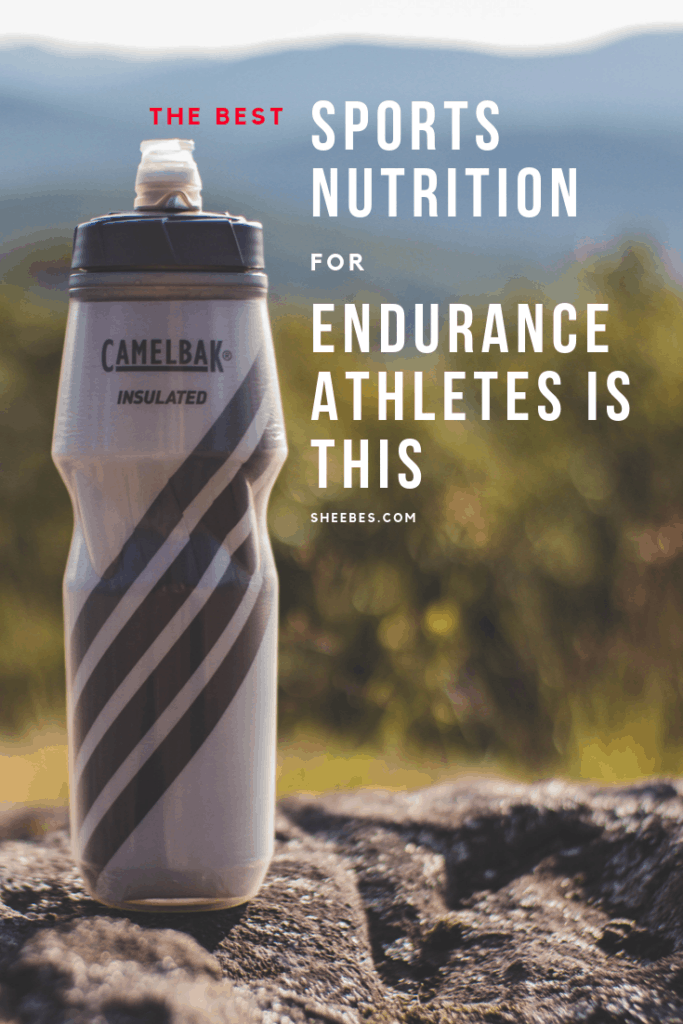Have you ever wondered…
- “What should I eat before a race?”
- “How many carbs should I consume?”
- “How much should I drink as I’m training and racing?”
If you have, then this post will help.
You’ll learn exactly what to eat and drink to help you perform well (goodbye bonking) both in training and in racing.
Here you’ll discover what the research says about sports nutrition for endurance athletes—cyclists, runners, and triathletes.
And you’ll also learn:
- What to drink.
- The right number of carbs to consume.
- How to fuel and hydrate for your race.
- Whether caffeine boosts your performance.
- Specific recommendations for female endurance athletes. (Yes, it differs from male athletes.)

Whether you’re a runner looking for running tips or a cyclist searching for cycling advice, this site is here to help you elevate your fitness game.

Sheebes is here to give mental toughness tips and resources to help you, the endurance athlete, achieve your personal best. To keep the lights on and content free, we are a participant in the Amazon Services program and other select affiliate networks. This means if you click on an affiliate link below, Sheebes will earn a small commission, at no cost to you.
DOES WHAT YOU CONSUME MATTER? APPARENTLY, YES.
What you consume converts into glucose (a sugar). The glucose you don’t use right away gets stored away in your muscles as glycogen to use as fuel for your endurance activity.
Fading and feeling fatigued? It’s often linked with muscle glycogen depletion and lower blood sugar levels. However, these things alone don’t limit your endurance.
There’s one more piece to this puzzle—dehydration.
SPORTS NUTRITION FOR ENDURANCE ATHLETES: WHAT TO DRINK
As you’re working hard, you’re creating heat and must sweat to cool off. This sweat loss needs to be offset—to prevent dehydration—by consuming fluids.
Now, this is an important note: It’s critical to maintain a fine balance between hydration and dehydration.
You want to prevent dehydration (that means you shouldn’t lose over 2-3% of your body mass) but not consume so many fluids that you’re drinking above your sweat rate that leads to hyponatremia or low blood sodium.
60 MINUTES BEFORE TRAINING OR RACING
Drink fluids slowly (about 5–7 mL per kg of body weight) at least 4 hours before training.
So if you’re roughly 140 pounds, you’ll want to drink 11—15 oz. of fluids. Or, if you’re a beer drinker, the amount of fluids to consume is close to a pint.
If you do not produce urine, or it is dark or highly concentrated, slowly drink more fluids (for example, another 3–5 mL per kg of body weight) about 2 hours before training or racing.
Weigh about 140 pounds? You need an additional 6—11 oz. of fluids, so think Starbucks short (8 oz.) to tall (12 oz.) size.

THIS IS WHAT FEMALE ENDURANCE ATHLETES SHOULD DRINK
Women are more prone to hyponatremia than men. This is mostly because women have a smaller total body water content and extracellular fluid volume. It takes less water to dilute sodium levels.
But other factors that contribute to hyponatremia: longer race times, elevated estradiol (a form of estrogen), and progesterone levels during the days leading up to a monthly cycle. (Specifically, it’s the luteal phase.)
Women should consume sport drinks that contain 4-8% carbs (at a rate of 0.4–0.8 l/ h; 13-27 oz/ h) with electrolytes. There’s no specific recommendation for electrolytes because sweat rates vary wildly with individual.
The bottom line is, you should not lose more than 2% of your body weight in a race.
Need some recommendations?
- This vegan performance powder gives you 8% carbs in 12 oz of water.
- This endurance fuel provides you with 7% carbs in 12 oz. of water.
- This drink mix gives you 6% carbs in 12 oz. of water.
HOW ENDURANCE SPORTS NUTRITION AFFECTS YOUR RACE PERFORMANCE

WHAT TO EAT BEFORE A RACE
Research shows that there’s no performance benefit of carb-loading when your event is less than 90 minutes.
Over 90 minutes? Then carb requirements vary depending on the individual, from around 5 to 12 g/ kg a day. If you weigh about 140 pounds, that means you need about 317 g to 762 g of carbs a day.
Let’s say for breakfast you ate:
- 1 cup cooked oatmeal – 27 g carbs
- 1 tablespoon maple syrup – 13 g carbs
- 1 banana – 27 g carbs
- 1 ounce chopped walnuts (14 halves) – 4 g carbs
- 2 tablespoons chopped dried cranberries – 12 g carbs
Then your total carb consumption for breakfast would be about 83 g carbs, close to a third (on the low end of the spectrum) of total carbs for the day.
Though you may be able to consume more carbs than recommended, it might not always result in better performance. For some athletes, eating a large number of carbs can lead to uncomfortable water weight gain.
WHAT TO EAT AND DRINK DURING A RACE
EAT YOUR CARBS
Researchers discovered that not only can ingesting carbs better your performance, so can carb rinses.
That is, rinsing your mouth with a carb solution and spitting it out. Though, the exact role of why this happens isn’t totally understood yet. It’s an interesting discovery, but right now two specific guidelines exist for carb consumption and racing.
If your race lasts for 1 hour to 2.5 hours, consider consuming 30—60 g of carbs per hour. (This mix is designed for sessions under 3 hours.)
If your race is over 2.5 hours, consider up to 90 g of carbs per hour. (This mix is designed for long efforts. And this one is specifically for women.)
These guidelines don’t take into account body weight, so these suggestions will require some experimenting on your part to determine your optimal number of carbs.
DRINK YOUR FLUIDS
Before racing, weigh yourself. Knowing your body weight helps you determine how much fluid you’ve lost during a race.
But if you don’t want to know your body weight, that’s okay too.
It will be harder to determine your fluid loss, but the main objective is to ensure your fluid intake also contains sodium to prevent hyponatremia.
The goal is to limit fluid loss to 2-3% of your body weight for any event over 90-minutes.
So to enhance water absorption, your drink should contain sodium 1 for optimal absorption to prevent hyponatremia.
For women, remember these recommendations? These also include sodium.
- This vegan performance powder gives you 8% carbs in 12 oz of water, with 300 mg of sodium.
- This endurance fuel provides you with 7% carbs in 12 oz. of water, with 303 mg of sodium.
- This drink mix gives you 6% carbs in 12 oz. of water, with 380 mg of sodium.

BOOST YOUR PERFORMANCE WITH CAFFEINE
Whether you’re a regular caffeine fiend or not, you could benefit from consuming caffeine in doses ranging from 3–6 mg per kg (that’s 190 mg to 381 mg if you weigh 140 pounds) taken about an hour before a workout. That works out to be either one medium-sized cup of coffee or two cups of black tea.
Other studies have shown lower doses of caffeine (1 mg per kg every 2 hours, roughly equivalent to one espresso shot) taken during an endurance task also enhances performance.

SPORTS NUTRITION FOR FEMALE ENDURANCE ATHLETES
The general guideline is, if you’re training hard, you’ve got to eat more.
- Daily protein consumption should be between 1.2 and 1.6 g/kg a day. Or, for a 140-pound woman, that’s 76g to 102g of protein a day.
- Female athletes are less responsive to carb-loading than males. But there are still some benefits to eating over 8g of carbs/ kg a day before a race. That translates into over 508g of carbs for a 140-pound female athlete.
- Female runners are at higher risk of deficiencies in iron, calcium, and/or vitamin D. Because of this, there are specific recommended daily allowances:
- Iron: 18 mg for iron (unless you’re taking an oral contraceptive which means the iron requirement is 11mg/day)
- Calcium: 1000 mg for calcium
- Vitamin D: 300-2,000 IU. If you’re living in a sunny place, you might be on the lower end of the vitamin D spectrum.

Sources
https://www.tandfonline.com/doi/full/10.1080/02640414.2011.610348
- That’s 10–30 mmol/l or 230 mg to 690 mg per 33 fl oz ↩